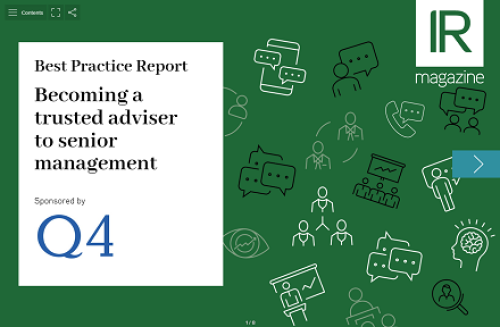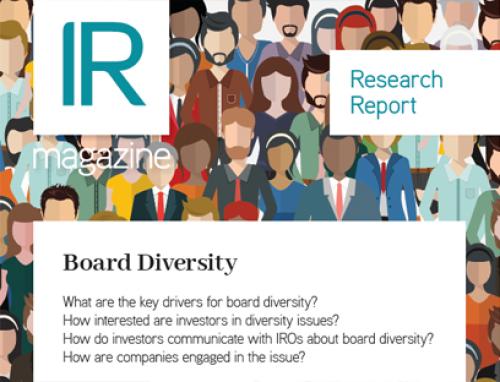Pat Marshall served as vice president of communications and investor relations at Cineplex for 15 years before retiring earlier this year. During her time with Cineplex, she was a regular fixture at the IR Magazine Awards – Canada, and was presented with the lifetime achievement award in 2017. At the time, she stressed the importance of working with a smile on your face.
In this Q&A, Marshall talks about how investor relations changed during her career and what the community she found through CIRI and IR Magazine meant to her.
How has the IR profession changed during the course of your career?
When I first started in IR, every time I told people what my job title was I had to explain what the job entailed. There wasn’t really a whole lot of understanding about what investor relations was. Not every public company had an IR officer, and certainly not an IR team. It was often the responsibility of the CFO.
Being responsible for the role and developing it was really one of my key learnings. I had to educate the company internally – not so much the CEO, CFO and COO, who knew what IR was, but other executives who weren’t necessarily aware of its importance to the company. As soon as they realized IR had a potential impact on their stock options, however, they realized I was a person they wanted to get to know.
Now people understand the role much more and understand its importance. Retail and institutional investors also have much more respect for the role.
How did technology such as the internet and email change the role?
The intensity over the last five years is significantly different from what it was in the beginning. When I started out in IR, it really was a Monday-to-Friday, nine-to-five job. We weren’t on emails or constantly checking our BlackBerrys. Back then there wasn’t the expectation of an immediate response, but there certainly is an expectation of a very quick, if not immediate, response from some shareholders today.
How did your skill set evolve as the role changed?
In some ways my skills changed immensely, but in other ways I was able to call on my previous skills and experience in sales and marketing and of being a business leader with P&L responsibility. Having had those experiences, I really had an insight into what shareholders would be looking for and what they would want to understand about the business. It led to far more impactful conversations with the investment community. I wasn’t trying to guess what they wanted; I felt I had a pretty good handle on it.
At the same time, however, when I started out in IR I didn’t know what I didn’t know. Ellis [Jacob, Cineplex’s president and CEO] and Gord [Nelson, Cineplex’s CFO] and I were really developing the IR role together from scratch. Everything was brand new and I was having to source vendors. As a team, we had an attitude that we would work with the investment community to provide what we could, we would enhance our disclosures whenever we could and we would listen to what the investment community wanted – and we continued doing that all the way through.
I didn’t know that IR Magazine or CIRI existed for the first two or three years I was in IR. Once I discovered them it was like euphoria: they were so valuable. I recently rediscovered the first letter I received from IR Magazine telling me I’d been nominated for the best IRO award and Cineplex had been nominated for best investor relations. At first, I thought it was one of those companies that gives out awards to companies that pay for them. Then I called some people I knew and they said it was legitimate, so we went to the awards and we were blown away. It set a whole new level for what we were doing and what we could do in the future. It opened up a whole new network of people I could get involved with.
What are some of your career high points?
I come from the motion picture industry and I always looked at the IR Magazine Awards as the Oscars of the industry. When I won that first award it was huge. For the team – and for me personally – we’re very fortunate to have won many awards over the years because they came from the investment community and it was our shareholders who voted, which always meant a lot to us.
Winning the lifetime achievement award [in 2017] really felt like my Oscar-winning moment. It was the most extraordinary experience I’ve ever had in my career. I had flowers, gifts, cards, phone calls and emails that went on for weeks. It was such an extraordinary celebration – that evening I felt like queen of the world! This past year, it was amazing to have been made a fellow of CIRI, which is something I never would have imagined. And to get the CIRI award for excellence in investor relations was also a big moment.
The appreciation and respect that Ellis, Gord and I gained from the Street was great and a real highlight for me. I realized after a certain point that I could go in to meetings with investors on behalf of Ellis or Gord and represent them. That was really fantastic and felt like a moment of personal growth.
What advice do you have for people starting out in IR today?
Try to join a team or an organization that will let you learn as much as you possibly can. Get involved with the community. You will learn so much and you’ll have so much fun – IR is really a great community. It’s always been open and welcoming. I remember going to my first CIRI conference in Whistler: I went on my own and just started walking around and saying hello to people. Everyone was so welcoming it was like I belonged immediately.
What do you think the future holds for investor relations?
I think the demand for good IR will only grow and IROs will become more senior. Right now, IROs can be at very different levels within organizations, but they should consistently be at the highest levels, involved in strategy development and feeding that back to the investment community.
One of the frustrations I had in the last few years was the arrival of online blogs and chatrooms that are gaining a lot of influence, particularly with retail investors. Coupled with the demise of well-researched journalism in the mainstream media, that makes the storytelling side of IR much more challenging. Stories don’t have to be factually checked on some of these websites and can reach a lot of people. That can have an impact on the stock and can cause a lot of work for IROs to get the company story back on track.
Any final thoughts or comments?
When we see what’s happened of late in the magazine world, I’d like to say congratulations to Janet [Dignan, IR Magazine’s founding editor and former CEO] and Ian [Richman, IR Magazine’s co-founder and president]. I’ve always appreciated these relationships and have benefitted significantly from them.
As IR Magazine builds up to its 30th anniversary issue – the upcoming winter 2018 issue, which will be the 279th edition of the industry’s flagship magazine – we’ll be posting more throwbacks to old covers, revisiting some of the hot topics from the past 30 years of investor relations and hearing from some of the industry titans.










